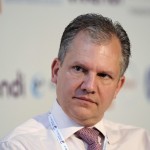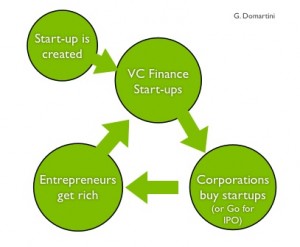 Last week, I had the privilege to be invited to the eG8 in Paris, one of the largest and most elite high-tech gatherings of the year. CEOs from France Telecom, Google, Facebook, Vivendi, NYT, etc. etc. were in attendance... simply put, the only tech-star missing was Apple! The objective of the forum was, as French President Sarkozy said, to "use attendees expertise to help reinforce democracy, solidarity and social dialogue," and define "a basic minimum of values and rules agreed at the world level." Stemming from this ambitious agenda, many high-quality summaries and commentaries were posted online, especially those written by Harvard Business Review and O'Reilly blog.
Last week, I had the privilege to be invited to the eG8 in Paris, one of the largest and most elite high-tech gatherings of the year. CEOs from France Telecom, Google, Facebook, Vivendi, NYT, etc. etc. were in attendance... simply put, the only tech-star missing was Apple! The objective of the forum was, as French President Sarkozy said, to "use attendees expertise to help reinforce democracy, solidarity and social dialogue," and define "a basic minimum of values and rules agreed at the world level." Stemming from this ambitious agenda, many high-quality summaries and commentaries were posted online, especially those written by Harvard Business Review and O'Reilly blog.
Apart from this very ambitious and controversial agenda, my personal objective was to see how a young entrepreneur, with a freshly launched company, can accelerate success thanks to strategies learned at eG8.
1- The Time is right! Enormous growth is still possible for those who innovate.
One of the most insightful documents released during eG8 was this great report from McKinsey, which finally shed light on the role of internet in the economy of 13 key Western and Asian countries. In these countries, the internet economy accounts for 3.4% of GDP, and most interestingly, contributed to 21% of GDP growth in the past 5 years. In other words, innovation fuels growth. We all believe it, but now the there is proof. While many large corporations and governments have been skeptical regarding this economic potential, hopefully this news will accelerate novel reforms that support web innovation.
Lesson1: While the internet as a technology matures, there has never been a better time to start an internet business. If the internet accounts for 3.4% of GDP today, can you imagine the future when the internet will count for 8-9% GDP? So, let's seize this potential and go for it!
2- Corporate Europe, WAKE-UP!
After starting on such a positive note, there is the frustrating reality of the European start-up ecosystem. There exists a HUGE gap between the European and American start-up scenes. Having worked for nearly 15 years in American companies, I am familiar with this disparity, but was shocked by its pervasiveness at the eG8. Here a few reasons for these differences:
1 - Most French (and Southern European) entrepreneurs don't have a good command of the English language. Yes, you read that properly! To name a few, Stephane Richard, CEO of Orange/France Telecom, Xavier Niel - CEO Free, Antoine Granjon - CEO Vente-Privée, and many more don't speak English properly. Moreover, they don't care. Well, one could think, why bother as they've been successful regardless of their English skills. NO! This perpetuates the belief that Europeans are incapable of moving abroad and competing in a global business environment. I have witnessed this in almost every meeting I have had with VCs.
2- The Venture ecosystem is not working because large corporation don't invest in start-ups. Wow! What a contrast between Eric Schmit, Google's current chairman, and Stephane Richard, CEO Orange: Eric Schmit wonders "Is there a technological solution that can scale, that can work globally, and move very quickly?" while Stephane Richard thinks "We need to be careful, look for state subsidies, regulate...". Google buys an average 10 to 20 start-ups a year from around the globe, spending between tens and hundreds of millions on these start-ups. On the other hand, what does Orange do? Orange invests in only a handful of start-ups, mostly Franco-French ones, and then spends crazy amounts of money to partner with other large telcos like Deutsche Telecom.
What are the consequences of the 2 factors mentioned above? Simply put, the ecosystem is broken. Since they move too slow, the top European start-ups (especially in the B2C space) relocate to the US or receive significantly higher US funding in their 2nd or 3rd rounds. Usually, these start-ups are then acquired by US companies, thus ensuring that management is settles in the US and that investments stay local. As these start-ups fuel innovation, it is worthwhile to examine the situation in the Silicon Valley. The Silicon Valley is a revealing case as many successful companies now located there were built up by non-US citizens, namely: eBay (French); Skype (Nordic); Google (Russian)... They created a start-up, hired hundreds of employees, sold off this initial venture for millions of dollars and have used the money to invest in more and diverse projects such as building schools, data centers, and fostering mentorships that will allow the future to shine.
Lesson 2: Stay away from conventional thinking, be patient, and get ready to shake the tree (or travel the ocean)! I wish success for our current business venture and to be able to build upon this success by starting a new type of venture activity, mixing large corporate interests and start-ups in Europe. Think, a super-seedcamp a-la Y-Combinator in Amsterdam!
3- Try fast, fail fast, adapt, try again, and you'll succeed.
 The reaction of Arthur Sulzberger, CEO of NYT, during the panel "Disinter-Media" was very interesting. Pressed by questions from his European colleagues regarding "will people pay for content, are newspapers dead, are paywalls the right answers, was it rights to give news for free, etc.", his reply was to the point. Arthur Sulzberger said, "We don't have all answers, yet what we know for sure is that we need to try many scenarios, innovate, show the way, be ready to fail sometimes, and this way we'll keep our lead". NYT claims to have had 650,000 subscribers 3 years ago and now boasts having 840,000. With 42M unique visitors, thousands of journalists, and $1B+ in revenue that keeps shrinking, they certainly have a lot to worry about. Still, NYT prefers to try new innovations like their paywall and invest in startups like ongo to combat their sluggish numbers.
The reaction of Arthur Sulzberger, CEO of NYT, during the panel "Disinter-Media" was very interesting. Pressed by questions from his European colleagues regarding "will people pay for content, are newspapers dead, are paywalls the right answers, was it rights to give news for free, etc.", his reply was to the point. Arthur Sulzberger said, "We don't have all answers, yet what we know for sure is that we need to try many scenarios, innovate, show the way, be ready to fail sometimes, and this way we'll keep our lead". NYT claims to have had 650,000 subscribers 3 years ago and now boasts having 840,000. With 42M unique visitors, thousands of journalists, and $1B+ in revenue that keeps shrinking, they certainly have a lot to worry about. Still, NYT prefers to try new innovations like their paywall and invest in startups like ongo to combat their sluggish numbers.
Lesson 3: Whatever the size of the company, it is normal to be scared when you make a decision. For instance I felt decision making was easier while working for large corporations versus now, now that is it my own money. Still, the principles are the same. To innovate, you need to invest and without risks, there is no reward.
On a final note and against the naysayers: Congrats to Sarkozy for organizing this event in Paris, France. Congrats to Publicis and Maurice Levy for enticing such an incredible pool of speakers to come. My hope is that there will be more initiatives like this one in the near future.




